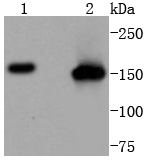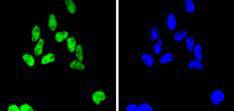Product Name :
SMC1 polyclonal antibody Background :
The SMC (structural maintenance of chromosomes) family of proteins form heterodimeric complexes that modulate sister chromatid cohesion and chromosome condensation for mitosis. SMC1α (structural maintenance of chromosomes protein 1A), also known as SMC1, SMCB, CDLS2, SB1.8, SMC1L1 or DXS423E, is a 1,233 amino acid nuclear protein that is involved in chromosome cohesion during the cell cycle. SMC1α interacts with BRCA1 and is phosphorylated by ATM, indicating a potential role in DNA repair. SMC1α is a component of the cohesion complex, which is required for the cohesion of sister chromatids after DNA replication. Mutations in the gene encoding SMC1α may be the cause of Cornelia de Lange syndrome (CdLS), which is a clinically heterogeneous developmental disorder characterized by facial dysmorphia, upper limb malformations, growth and cognitive retardation. Product :
Rabbit IgG, 1mg/ml in PBS with 0.02% sodium azide, 50% glycerol, pH7.2 Storage&Stability :
Store at +4°C after thawing. Aliquot store at -20°C or -80°C. Avoid repeated freeze / thaw cycles. Specificity :
SMC1 polyclonal antibody detects endogenous levels of SMC1 protein. Immunogen :
recombinant protein Conjugate :
Unconjugated Modification :
Unmodification
SMC1 polyclonal antibody Background :
The SMC (structural maintenance of chromosomes) family of proteins form heterodimeric complexes that modulate sister chromatid cohesion and chromosome condensation for mitosis. SMC1α (structural maintenance of chromosomes protein 1A), also known as SMC1, SMCB, CDLS2, SB1.8, SMC1L1 or DXS423E, is a 1,233 amino acid nuclear protein that is involved in chromosome cohesion during the cell cycle. SMC1α interacts with BRCA1 and is phosphorylated by ATM, indicating a potential role in DNA repair. SMC1α is a component of the cohesion complex, which is required for the cohesion of sister chromatids after DNA replication. Mutations in the gene encoding SMC1α may be the cause of Cornelia de Lange syndrome (CdLS), which is a clinically heterogeneous developmental disorder characterized by facial dysmorphia, upper limb malformations, growth and cognitive retardation. Product :
Rabbit IgG, 1mg/ml in PBS with 0.02% sodium azide, 50% glycerol, pH7.2 Storage&Stability :
Store at +4°C after thawing. Aliquot store at -20°C or -80°C. Avoid repeated freeze / thaw cycles. Specificity :
SMC1 polyclonal antibody detects endogenous levels of SMC1 protein. Immunogen :
recombinant protein Conjugate :
Unconjugated Modification :
Unmodification
-
 Western blot analysis of SMC1 on different lysates using anti-SMC1 antibody at 1/1,000 dilution. Positive control: Lane 1: NIH/3T3 Lane 2: Hela
Western blot analysis of SMC1 on different lysates using anti-SMC1 antibody at 1/1,000 dilution. Positive control: Lane 1: NIH/3T3 Lane 2: Hela -
 ICC staining SMC1 in Hela cells (green). The nuclear counter stain is DAPI (blue). Cells were fixed in paraformaldehyde, permeabilised with 0.25% Triton X100/PBS.
ICC staining SMC1 in Hela cells (green). The nuclear counter stain is DAPI (blue). Cells were fixed in paraformaldehyde, permeabilised with 0.25% Triton X100/PBS.
Bioworld Biotech only provide peptides for our antibodies and do not provide additional peptide customization services.
Price/Size :
USD 368/1mg/vial
Tips:
For phospho antibody, we provide phospho peptide(0.5mg) and non-phospho peptide(0.5mg).Describe :
Blocking peptides are peptides that bind specifically to the target antibody and block antibody binding. These peptide usually contains the epitope recognized by the antibody. Antibodies bound to the blocking peptide no longer bind to the epitope on the target protein. This mechanism is useful when non-specific binding is an issue, for example, in Western blotting (WB) and Immunohistochemistry (IHC). By comparing the staining from the blocked antibody versus the antibody alone, one can see which staining is specific; Specific binding will be absent from the western blot or IHC performed with the neutralized antibody.Formula:
Synthetic peptide was lyophilized with 100% acetonitrile and is supplied as a powder. Reconstitute with 0.1 ml DI water for a final concentration of 10 mg/ml.The purity is >90%,tested by HPLC and MS.
Storage:
The freeze-dried powder is more stable. For short time at 2-8°C. For long term storage store at -20°C.
Note :
This product is for research use only (RUO only). Not for use in diagnostic or therapeutic procedures.
 SMC1 polyclonal antibody
SMC1 polyclonal antibody  Datasheet
Datasheet COA
COA MSDS
MSDS SHIP
SHIP